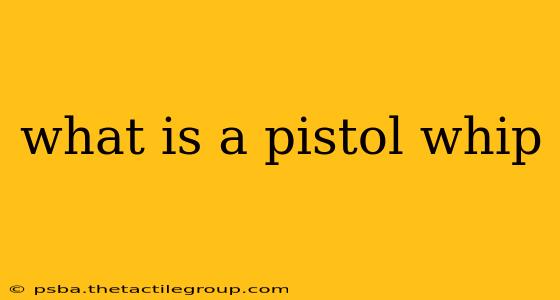The term "pistol whip" refers to a violent act involving the use of a handgun as a blunt weapon. Instead of firing the weapon, the user strikes a target with the pistol's grip, often the butt or the slide, causing significant injury. This isn't a standard firearms technique; rather, it's a brutal, improvised method used in self-defense or assault. Understanding its mechanics, implications, and legal ramifications is crucial.
The Mechanics of a Pistol Whip
The effectiveness of a pistol whip hinges on several factors:
-
The Weapon: Heavier pistols, like revolvers or larger semi-automatics, deliver more impact. The material of the grip also plays a role; a polymer grip might break under extreme force, whereas a heavier metal grip will sustain more impact.
-
The Strike: The force and location of the strike determine the severity of the injury. A blow to the head, for example, can be lethal. Strikes to the body can cause bruising, lacerations, fractures, and internal bleeding.
-
The Target: The target's physique and the area struck significantly impact the outcome. A frail individual is more vulnerable to serious injury than a robust person.
Injuries Caused by Pistol Whipping
Pistol whipping can result in a wide range of injuries, including:
- Concussions: Blows to the head can cause brain injuries, ranging from mild concussions to severe traumatic brain injuries.
- Fractures: Strikes to the bones, especially facial bones, ribs, or limbs, can cause fractures.
- Lacerations: The rough texture of a pistol grip can cause deep cuts and abrasions.
- Bruising: Significant bruising and swelling are common.
- Internal Bleeding: Blows to the abdomen or chest can cause internal injuries and bleeding.
- Death: In extreme cases, a pistol whip, particularly to the head, can be fatal.
Legal Ramifications
Using a firearm as a bludgeon is a serious crime, carrying potentially severe penalties. Even in self-defense scenarios, the use of excessive force can lead to criminal charges. The legal consequences depend on several factors, including:
- Jurisdiction: Laws vary significantly by location.
- Intent: Was the act premeditated, or was it a spur-of-the-moment reaction?
- Proportionality of force: Did the level of force used align with the perceived threat?
- Evidence: Witness testimony, medical reports, and forensic evidence are crucial in determining guilt or innocence.
It is important to consult legal professionals for advice on any self-defense scenario involving a firearm. The use of a firearm for anything other than its intended purpose carries significant risks.
Conclusion: Avoidance is Key
Pistol whipping is a dangerous and illegal act. While it may be used in self-defense scenarios, the risk of serious injury or legal repercussions is extremely high. Emphasis should be placed on de-escalation techniques and utilizing less dangerous self-defense methods whenever possible. If faced with a violent situation, prioritizing your safety and seeking appropriate assistance are paramount. Remember, lawful self-defense involves proportionate response and a focus on survival, not causing excessive harm.

